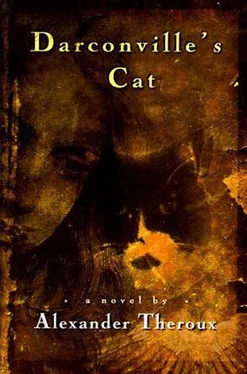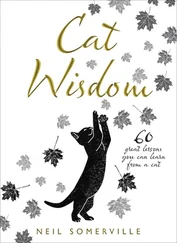As it happened, he never attained to the priesthood — not, however, because he didn’t again try. For try again he did, but failed once more. And yet with what reckless audacity, with what fierce, uncompromising passion did he always charge and fight and charge again! Resignation to appointed ends? He was not of an age for that. And as there hovered before him, always, a sense of disgust in resigning the soul to the pleasures and idle conveniences of the world, his aspirations, individual and metaphysical, led abruptly to another decision. He entered a Trappist monastery at eighteen and yet, again, before long fell into confusion and a particular variety of quarrels there for which he was never directly responsible but to which, as we’ve seen, even the most saintly precincts are liable. The principal agent of the worst of them was a priggish anathemette named Frater Clement who, without the gift of reason, much less the gift of faith, had as his goal not the salvation of his soul but the acquisition in matrimony of a blond boy, another novice, who thought the world was run and possibly owned by the Order of Cistercians. His submission was naïveté, but Darconville grew impatient with the other’s venal disability. And one afternoon as the monks were proceeding to nones, he snared the hypocrite by the cowl, pulled him into a side-cloister, and — not without stuttering — adroitly gave him the lecture on spiritual discipline he found later, much to his own grief, he himself couldn’t follow, for he saw he couldn’t forgive Frater Clement, whose jug ears alone at chant and chapter phosphorized his charity on the spot. Dismal depression followed. He received the blessing of the Abbot, who repeated the famous words of the old desert fathers: “ fuge, tace, et quiesce ” and, leaving the following day in an egg truck — with one suitcase, a great fat pen, and all his limitations — went bouncing over the hill in the direction of the declining sunshine.
At twenty, in what was probably the climactic event of his life, Darconville discovered writing, the sole subject of his curiosity at this time being words and the possibility of giving expression to them. Now, among those fragile loves to which most men look back with tenderness and passion, certain must be singled out as of special importance: in young Darconville’s life it was to be his proud and irrepressible grandmama whose affection for him was always on the increase and who — never once having failed to give fortitude to his individuality, although in quaint deference to his family’s nobility on the paternal side she used only his surname in matters of address, a habit he would continue all his life — with rising emphasis that gave words to his inward instincts encouraged him at this critical juncture of his life to go live with her in Venice. At every point she was replete with wise suggestions, the value of which he recognized and the tenor of which he followed. Did he want to write? she had asked and upon the instant answered Darconville, who had but to follow the direction of her raised and superintendent cane to a corner where sat a beautiful desk.
It wasn’t long before his grandmother passed away. The palazzo, immediately becoming the object of what had even long before been a curious litigation, was locked up. And so with a certain amount of money earmarked for his education, belated for the clerical years, he took her cat, Spellvexit — his sole companion now — and set sail back to the United States, looking once more for the possibilities of the possible as possible. The spirit of his youthful dreams, long, strangely enough, having retarded his purposes rather than advancing them, he studiedly refused to renounce: of justice and fair play, of living instead of dying, of loving instead of hating. Single virtue, he always believed, was proof against manifold vice. And yet all the caprices and aspects of human life that gratified curiosity and excited surprise in him continued only as incidents on the way to Glory.
Darconville — wherever — quite happily chose to live within his own world, w’thin his own writing, within himself. The thickest, most permanent wall dividing him from his fellow creatures was that of mediocrity. His particular sensibility forbade him to accept unquestioned society’s rules and taboos, its situational standards and ethics, syntheses that to him always seemed either too exclusive or too inclusive. His domineering sense of right, as sometimes only he saw it, and his ardent desire to keep to the fastness of his own destiny, set him apart in several ways. Reclusive, he shrank from all avoidable company with others — it was the prerogative of his faith to recognize, and of his character to overpower, objection here — and chose to believe only that somewhere, perhaps on the footing of schoolmaster, he could inoffensively foster sums, if modest, then at least sufficient to allow him the time to write. He sought the land of Nusquamia, a place broadly mapped out in James 4:4, and whether by chance or perchance by intention one day, wasting no time balancing or inquiring, he selected a school for the purpose, was hired, and disappeared again into the arcane. It didn’t really have to have a name. In fact, however, it did. It was a town in Virginia, called Quinsyburg.
The train whistle there every evening seemed to beckon, dusk, precreating a mood of sudden melancholy in a wail that left its echo behind like the passing tribute of a sigh. And Darconville, while yet amply occupied, was by no means so derogate from the common run of human emotions as not to share, upon hearing it — Spellvexit always looked up — a derivative feeling of loneliness, a disposition compounded, further, not only by the portentous evidences of the season but also by the bleakness of the place upon which it settled. The town was the quotidian co-efficient of limbo: there was no suddenness, no irresistibility, no velocity of extraordinary acts. He found hours and hours of complete solitude there, however, and that became the source, as he wrote, not of oppressive exclusiveness but of organizing anticipations he could accommodate in his work: the mystic’s rapture at feeling his phantom self. He had assumed this exile not with the destitution of spirit the prodigal is too often unfairly assigned, nor from any aristocratic weariness a previous life in foreign parts might have induced, but rather to pull the plug of consequence from the sump of the world — to avoid the lust of result and the vice of emulation.
There are advantages to being in a backwater, and at the margins, in the less symphonic underground, recriminations were few, ambition didn’t mock useful toil, and the bald indices of failure and success became irrelevant. The man beyond the context of hope is equally beyond the context of despair, and the serious vow Darconville had once made to himself, medievally sworn in the old ipsedixitist tradition of silent knights, holy knights, aimed to that still point; so it was with love as with loneliness: to fall in love would make him a pneumatomachian — an opponent of the spirit which, however, to him disposed to it, nightly blew its unfathomable afflatus down the cold reaches of the otherwise impenetrable heavens to quicken man to magic.
It didn’t matter where he was. No, the best attitude to the world, he felt, unless the Patristics belied us, was to look beyond it. Darconville was below envy and above want. And what pleasures a place denied to the sight, he hoped, were given necessarily to the imagination. He sought the broom of Eucrates, the sword of Fragarach, the horse of Pacolet. Prosperity, furthermore, had perhaps killed more than adversity, an observance fortified in him by what was not only the d’Arconville motto but also his grandmother’s most often repeated if somewhat overly enthusiastic febrifuge: “ Un altro, un altro, gran’ Dio, ma più forte !” And so he had come to this plutonial grey area, a neglected spot, where passersby didn’t look for art to happen as it might and when it would — to lose himself for good, in both senses, and realize the apocalypse that is incomprehensible without Patmos. The passion for truth is unsociable. We are in this world not to conform to it.
Читать дальше












